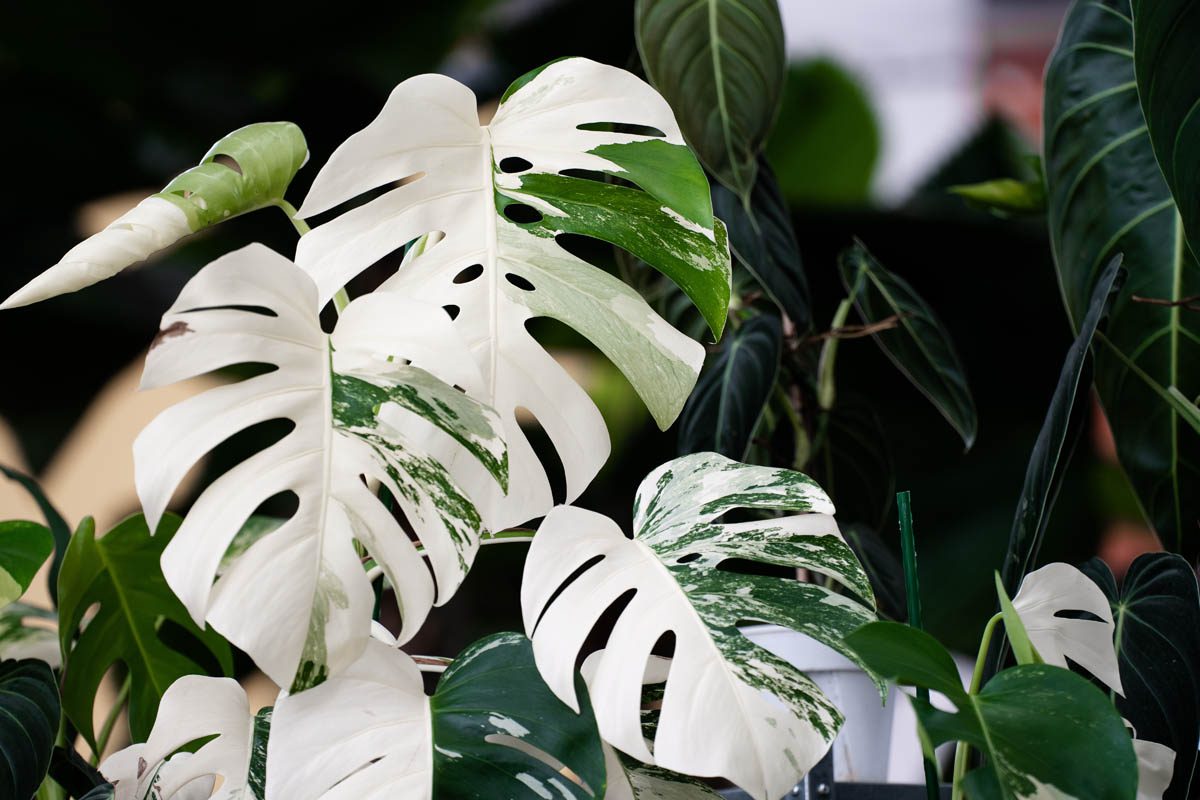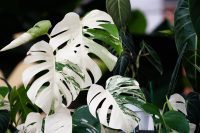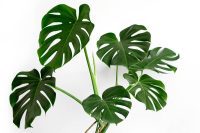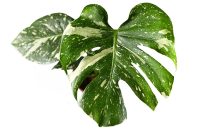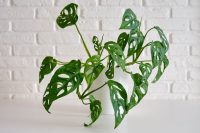Variegated Monstera deliciosa ‘Thai constellation’ or ‘Albo‘ are in high demand, and as such, command a hefty price tag starting at $300 for a small plant to over $1000 for a mature specimen. Plant collectors may be tempted to save money and grow variegated Monstera deliciosa from seed, which we look at.
Is it possible to grow a variegated Monstera from seed?
Due to the popularity of these plants, scammers on sites such as Etsy and eBay are attempting to take advantage of plant enthusiasts wanting their own variegated Monstera without the price tag.
Growing Monstera species from seed is possible, however, the chances that the seedlings will be variegated are incredibly low, even if the seeds have come from a variegated plant. Monstera plants contain both male flowers which contain pollen and female flowers which contain ovules. The pollen and ovules each contain half the DNA necessary to make a new plant, when they combine, the fertilised seed contains half its DNA from the male flower and half its DNA from the female to produce a unique plant genetically different to the parent plant.
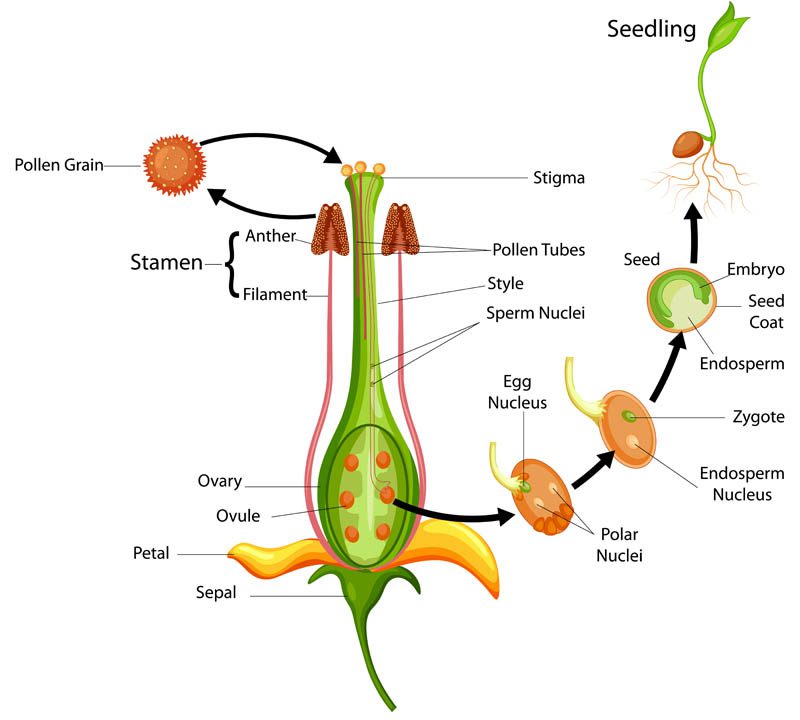
A Monstera grown from seed contains one genotype, the variegated Monstera is a chimera, with two genotypes. Growing from seed will not produce a variegated daughter plant, unless a spontaneous mutation occurs at some point, resulting in a chimera plant.
Recessive genes
It is sometimes claimed that the variegation in Monstera plants is caused by a recessive gene, and that is why it is not possible to grow variegated Monstera from seeds. Recessive genes require two copies (one from the male and one from the female parent) of the gene for the trait to present and are not uncommon. Variegation is caused by recessive genes in some plant species, but not Monstera. Plants that carry the recessive gene can pass on the trait via the seeds. If this was the case variegated Monstera species, then self-pollination of variegated Monstera or cross-pollination from a nearby variegated Monstera should produce variegated first-generation (F1) offspring. But we know that the variegation in Monstera is caused by a mutation and not a recessive gene.
What causes variegation in Monstera plants?
Variegation in Monstera species occurs due to a genetic mutation in the meristem which results in a plant with two distinct genotypes (unique DNA). One of these genotypes can produce chlorophyll, while the other genotype is unable to, resulting in areas of white or cream. The meristem is a type of tissue made up of undifferentiated cells that differentiate to form tissues of the plant. Most variegated Monstera deliciosa or M. adansonii are produced by taking a cutting from the mother plant or from tissue culture.
- Cuttings: Monstera species involves taking a cutting which includes node and axillary bud, from which the new leaf and roots will develop.
- Tissue culture: M. deliciosa ‘Thai constellation’ is grown by tissue culture in a laboratory in Thailand. Tissue culture involves obtaining a small sample from the mother plant, which is then cultured on a growing medium under sterile conditions to obtain a clone of the mother plant.
What about variegated Monstera deliciosa fruit?
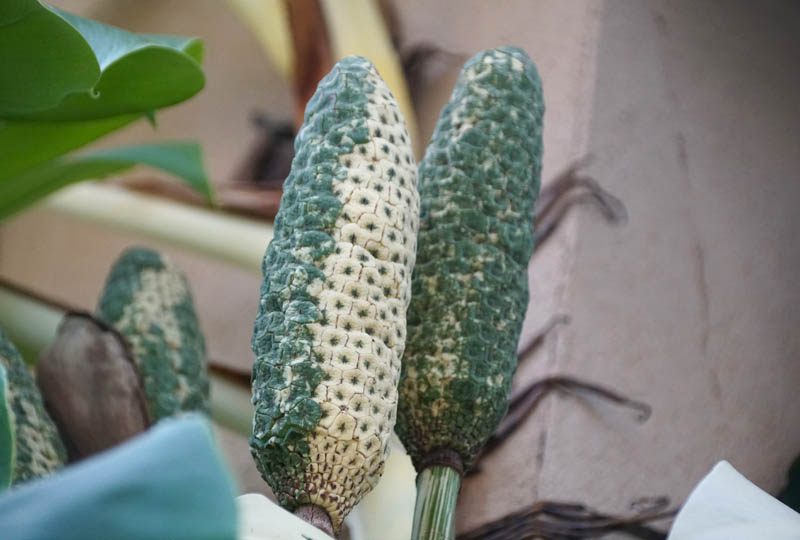
The M. deliciosa fruit above is made up of the outer fleshy layer, which may or may not be variegated, which encloses the fertilised seed. The seed contains half its DNA from the male flower and half from the female, but not two distinct sets of DNA necessary to produce a variegated plant.
Where to get a variegated Monstera
Variegated Monstera plants are still relatively rare but can be found on rare plant Facebook groups, specialist nurseries and Etsy. These plants have been propagated by cuttings or tissue culture. Cuttings may be freshly cut, without roots, with established roots, wet sticks or tissue culture. Unrooted cuttings and wet sticks (a cutting that only includes the node and axillary bud, but no leaves or roots) should be left to experienced plant growers, as they can be tricky to root. Immature tissue culture plants have a considerably lower price tag than a larger, established Monstera, but are incredibly tiny, delicate and easy to kill. If they were easy to grow, most garden centres would be selling tissue culture M. deliciosa ‘Thai constellation’, but they require patience and skill. It’s not a bargain if the plant dies and ends up in the bin.
Specialist nurseries
Your local nursery may be able to recommend a specialist nursery to purchase a variegated Monstera. Once again, because these plants carry a hefty price tag, there are plenty of scammers who will take your money and run. For readers in Australia, Altra Nursery in Sydney sometimes stocks variegated M. deliciosa and M. adansonii, and has been established for over 30 years. My thriving Thai constellation was purchased as an established 4-5 leaf plant from Newtown Garden Market. The plant retailed for $399, but the hard work had been done, and it was and remains healthy six months later (and now with 10 leaves). It’s better value to spend $400 on an established plant than $100 on a wet stick or immature tissue culture plant that might not make it.
Facebook marketplace and rare plant groups often have variegated Monstera plants for sale. Do your homework before you purchase an expensive plant from Facebook. Is the seller active in rare plant groups? Is their Facebook profile new, or have they been around for some time? Do they appear to have friends? Use tineye.com to run a reverse image search of the plant to check if the photo is already on the Internet. For example, the feature image in this article was purchased from Shutterstock, it is not my plant. A scammer can also use stock or stolen images and claim the plant is for sale.
Be wary of Facebook ads with images of variegated Monstera but no website presence or physical address. While some may be legitimate, many aren’t.
Always check the location of the seller, especially if you live in a country with strict quarantine/biosecurity laws. You do not want to spend money on an expensive plant from overseas only to have it destroyed by customs.
Julia is a writer and landscape consultant from Wollongong with a love of horticulture. She had been an avid gardener for over 30 years, collects rare variegated plants and is a home orchardist. Julia is passionate about learning and sharing her knowledge of plant propagation and plant toxicology. Whether it’s giving advice on landscape projects or sharing tips on growing, Julia enjoys helping people make their gardens flourish.
